China Insight
Another Apology to China? One Taiwanese Model and China’s Angry Cyber-Nationalism
Public anger and displays of cyber-nationalism often end with a public apology “to China.”
Published
8 years agoon

When a Taiwanese model recently scolded people from the mainland on social media, it triggered a wave of comments from netizens who took it as a personal insult and an attack on China. Anger has become a recurring display of Chinese cyber-nationalism. Controversies often end with a public “apology to China”.
Popular Taiwanese model ‘Stella’ (史黛拉) stirred controversy on Chinese social media on September 29 for calling mainlanders ‘426‘, a Taiwanese term for scolding people from the PRC.
The pronunciation of ‘426’ [死阿陆] sounds similar to ‘damned mainlanders‘ [死大陆人] in Taiwan’s Hokkien dialect.
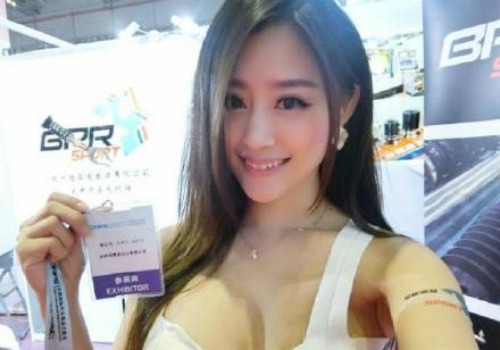
The model made the remarks as she posted pictures on her Facebook page that show her working at the Shanghai International Automobile Fair: “Can you let me take a selfie?! Masses of ‘426’ (damned mainlanders) want to take pictures with me, and Arabic people, Japanese and all kinds of bastards secretly photographing me and asking my number,” she complained.
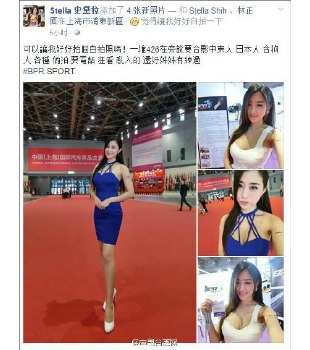
The model’s remarks triggered hundreds of reactions on Sina Weibo. Many Chinese saw the post as an indication of Taiwanese attitudes towards mainland China. Some netizens wrote: “Resist Taiwan bastards from earning money in China and then scolding mainlanders. Trash!”
“Taiwanese people have no inner qualities,” another Weibo user commented.
“Can’t the government take measures against people who insult mainlanders?”, another netizen said.
Similar controversies frequently surface on Chinese social media. Last August, Chinese netizens were furious after footwear brand K-Swiss launched a commercial that depicted an alleged Chinese character in a way that was called “insulting” and “humiliating” to China.
Popular Korean actor Park Bo Gum, who featured in the commercial, received a storm of criticism. Many Chinese netizens blamed him for ridiculing their country.
China’s Angry Cyber-Nationalism
News of ‘China’ getting its “feelings hurt” by foreign celebrities or institutions frequently pops up in Chinese media, leading to an angry display of Chinese cyber-nationalism.
According to Ying Jiang, the author of Cyber-Nationalism in China (2012), the roots of the “angry nationalism” expressed by today’s Chinese netizens can be traced back to China’s “Century of Humiliation” that took place from roughly the mid-1800s until after WWII.
During this period, China faced a great deal of hardships brought about by foreign powers. The Opium Wars and unequal treaties led to an economic and military decline, and ultimately caused China to weaken.
In the postwar 20th century, the rise of Chinese nationalism has gone hand in hand with an intensification of anti-foreign sentiments. A new wave of nationalism came about in the 1990s when Western influences on China were considered to negatively influence Chinese traditional culture. It was also the time when the government launched an extensive propaganda campaign of patriotic education, that especially impacted China’s younger generations.
Although China’s post-1990s generation is generally known for having a strong sense of internationalism, they also have a distinct sense of patriotism.
Author Zheng Jiawen recently wrote how the term ‘little pinkos’ (小粉红) nowadays refers to a high-profile group of Chinese young female netizens who go online to defend their patriotism. Taking action against foreign “insults” is part of their movement. They are not alone; the sentence “never forget national humiliation” (勿忘國耻) is ubiquitous on Chinese social media.
A Year of Apologies
China’s angry cyber-nationalism has become very apparent in 2016, a year in which China has received multiple apologies for “hurting the feelings of the Chinese”. Many of these incidents occured during the Rio Olympics.
One of the controversies involved an inaccurate Chinese flag. Chinese Olympic viewers were offended when a wrong version of the Chinese flag was used during several medal ceremonies. While the Chinese embassy in Brazil subsequently rushed to have accurate versions of the Chinese flag made by local manufacturers, netizens started a petition demanding an apology from the Rio Olympic organization.
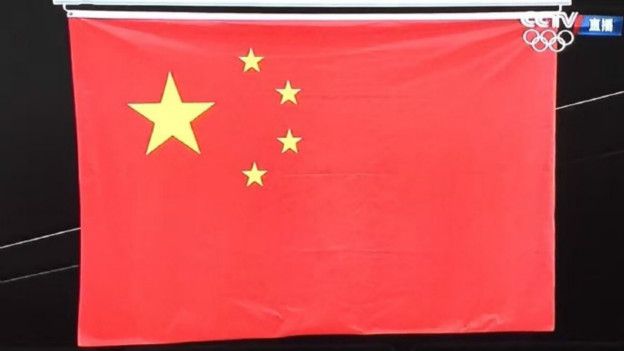 Subtle difference. This is the incorrect flag. The correct Chinese flag has one large star and four small stars, each of whose points angle towards the main star. See image below by Daily Mail.
Subtle difference. This is the incorrect flag. The correct Chinese flag has one large star and four small stars, each of whose points angle towards the main star. See image below by Daily Mail.
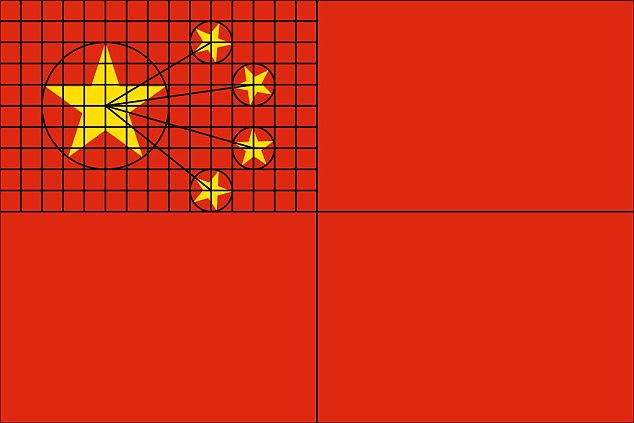
The flag mishaps continued. During the medal ceremony where Chinese swimmer Fu Yuan Hui shared the bronze with Canada’s Kylie Masse, the Chinese flag was seen hanging below the Canadian one. Many netizens viewed this as a sign of disrespect. Then there was Australia’s Channel 7 flag mix up where China was mistakenly represented by the Chilean flag, leading to furious reactions with another online petition demanding an apology from Channel 7.
Another noteworthy incident involved the Canadian media. When Canadian Olympic TV commentator Byron MacDonald thought his microphone was off, he insulted a Chinese athletic swimmer and caused outrage on Weibo. The presenter apologized shortly after.
The list does not end here. Back in January of this year, 16-year-old Taiwanese K-pop singer Chou Tzuyu got into trouble for waving a Taiwanese flag on a Korean reality show. Netizens criticized the singer for supporting Taiwan’s independence by waving the flag, which prompted Chou to release a video on the eve of Taiwan’s presidential elections to apologize for her actions.

Later in April, two cast members from No Other Love, a popular Chinese romantic film, also got into trouble for “insulting” China. Taiwanese lead actor Leon Dai was even removed from the film for his alleged support to the Taiwanese independence movement. American-born Japanese actress Kiko Mizuhara was criticized for being anti-Chinese for liking an Instagram photo that offended the Chinese.
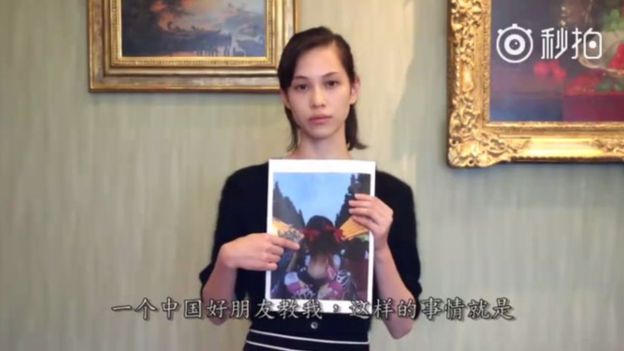
She later apologized in a 5-minute video on Weibo.
‘Apologize to China Contest’
According to some commentators, the sensitivity over “hurt feelings” sometimes becomes problematic. Last July, Japanese vlogger Kinoshita Yuka, known for eating large quantities of food on camera, came under fire after she posted a video of herself eating 137 bananas. Chinese netizens wondered if Kinoshita was eating bananas that originated from the Philippines, and if the 137 bananas were an allusion to China’s 1.37 billion population, as a revenge in reference to the South China Sea verdict.

The YouTube video soon triggered another war of words between Chinese and foreign netizens, as many Chinese netizens viewed the act as a deliberate insult aimed at China .
One comment read: “At a sensitive time like this, you release this video of you eating 137 Philippine-grown bananas to insult the Chinese, are you dumb? Do you think the Chinese are easily bullied?”
In the same month, Lady Gaga caused a ‘bad romance’ between herself and China after she met with the Dalai Lama. For many netizens, it marked the end of her career in China: “I like your songs, but I choose my country over you.”
Seeing this trend of Chinese people easily getting their “feelings hurt”, an activist in Taiwan named Wang Yikai started an “Apologize to China” contest in the summer of 2016. The contest soon went viral and attracted the attention of netizens from all over the world, including from China.
The contest received many creative apologies in all shapes and forms, from pictures to videos. The winning apology came from a Hong Kong group and was a parody of the song “Sorry Sorry” by Super Junior. In the parody, the group sings they are sorry for not loving China enough because they don’t own a made-in-China iPhone clone.

It seems that Taiwanese model Stella has chosen the wrong year to upset Chinese netizens. By now, she has removed her comments from her Facebook page, but the screenshots have already gone viral on Chinese social media.
“Go back to your own island!” many netizens say.
“Why are you Taiwanese always so disgraceful?” another Weibo user comments: “Good for us that you don’t call yourselves ‘Chinese’ when going abroad, otherwise you would give us all a bad name.”
The model has not responded to the controversy yet. Perhaps she can start by registering for next year’s ‘Apologize to China’ contest.
– By Manya Koetse and Chi Wen
Follow @WhatsOnWeibo
References
Ying Jiang. 2012. Cyber-Nationalism in China: Challenging Western media portrayals of Internet censorship in China. Adelaide: University of Adelaide Press.
©2016 Whatsonweibo. All rights reserved. Do not reproduce our content without permission – you can contact us at info@whatsonweibo.com.
Manya Koetse is the founder and editor-in-chief of whatsonweibo.com. She is a writer, public speaker, and researcher (Sinologist, MPhil) on social trends, digital developments, and new media in an ever-changing China, with a focus on Chinese society, pop culture, and gender issues. She shares her love for hotpot on hotpotambassador.com. Contact at manya@whatsonweibo.com, or follow on Twitter.

China Brands, Marketing & Consumers
A Brew of Controversy: Lu Xun and LELECHA’s ‘Smoky’ Oolong Tea
Chinese tea brand LELECHA faced backlash for using the iconic literary figure Lu Xun to promote their “Smoky Oolong” milk tea, sparking controversy over the exploitation of his legacy.
Published
3 days agoon
May 3, 2024
It seemed like such a good idea. For this year’s World Book Day, Chinese tea brand LELECHA (乐乐茶) put a spotlight on Lu Xun (鲁迅, 1881-1936), one of the most celebrated Chinese authors the 20th century and turned him into the the ‘brand ambassador’ of their special new “Smoky Oolong” (烟腔乌龙) milk tea.
LELECHA is a Chinese chain specializing in new-style tea beverages, including bubble tea and fruit tea. It debuted in Shanghai in 2016, and since then, it has expanded rapidly, opening dozens of new stores not only in Shanghai but also in other major cities across China.
Starting on April 23, not only did the LELECHA ‘Smoky Oolong” paper cups feature Lu Xun’s portrait, but also other promotional materials by LELECHA, such as menus and paper bags, accompanied by the slogan: “Old Smoky Oolong, New Youth” (“老烟腔,新青年”). The marketing campaign was a joint collaboration between LELECHA and publishing house Yilin Press.

Lu Xun featured on LELECHA products, image via Netease.
The slogan “Old Smoky Oolong, New Youth” is a play on the Chinese magazine ‘New Youth’ or ‘La Jeunesse’ (新青年), the influential literary magazine in which Lu’s famous short story, “Diary of a Madman,” was published in 1918.
The design of the tea featuring Lu Xun’s image, its colors, and painting style also pay homage to the era in which Lu Xun rose to prominence.
Lu Xun (pen name of Zhou Shuren) was a leading figure within China’s May Fourth Movement. The May Fourth Movement (1915-24) is also referred to as the Chinese Enlightenment or the Chinese Renaissance. It was the cultural revolution brought about by the political demonstrations on the fourth of May 1919 when citizens and students in Beijing paraded the streets to protest decisions made at the post-World War I Versailles Conference and called for the destruction of traditional culture[1].
In this historical context, Lu Xun emerged as a significant cultural figure, renowned for his critical and enlightened perspectives on Chinese society.
To this day, Lu Xun remains a highly respected figure. In the post-Mao era, some critics felt that Lu Xun was actually revered a bit too much, and called for efforts to ‘demystify’ him. In 1979, for example, writer Mao Dun called for a halt to the movement to turn Lu Xun into “a god-like figure”[2].
Perhaps LELECHA’s marketing team figured they could not go wrong by creating a milk tea product around China’s beloved Lu Xun. But for various reasons, the marketing campaign backfired, landing LELECHA in hot water. The topic went trending on Chinese social media, where many criticized the tea company.
Commodification of ‘Marxist’ Lu Xun
The first issue with LELECHA’s Lu Xun campaign is a legal one. It seems the tea chain used Lu Xun’s portrait without permission. Zhou Lingfei, Lu Xun’s great-grandson and president of the Lu Xun Cultural Foundation, quickly demanded an end to the unauthorized use of Lu Xun’s image on tea cups and other merchandise. He even hired a law firm to take legal action against the campaign.
Others noted that the image of Lu Xun that was used by LELECHA resembled a famous painting of Lu Xun by Yang Zhiguang (杨之光), potentially also infringing on Yang’s copyright.
But there are more reasons why people online are upset about the Lu Xun x LELECHA marketing campaign. One is how the use of the word “smoky” is seen as disrespectful towards Lu Xun. Lu Xun was known for his heavy smoking, which ultimately contributed to his early death.
It’s also ironic that Lu Xun, widely seen as a Marxist, is being used as a ‘brand ambassador’ for a commercial tea brand. This exploits Lu Xun’s image for profit, turning his legacy into a commodity with the ‘smoky oolong’ tea and related merchandise.
“Such blatant commercialization of Lu Xun, is there no bottom limit anymore?”, one Weibo user wrote. Another person commented: “If Lu Xun were still alive and knew he had become a tool for capitalists to make money, he’d probably scold you in an article. ”
On April 29, LELECHA finally issued an apology to Lu Xun’s relatives and the Lu Xun Cultural Foundation for neglecting the legal aspects of their marketing campaign. They claimed it was meant to promote reading among China’s youth. All Lu Xun materials have now been removed from LELECHA’s stores.

Statement by LELECHA.
On Chinese social media, where the hot tea became a hot potato, opinions on the issue are divided. While many netizens think it is unacceptable to infringe on Lu Xun’s portrait rights like that, there are others who appreciate the merchandise.
The LELECHA controversy is similar to another issue that went trending in late 2023, when the well-known Chinese tea chain HeyTea (喜茶) collaborated with the Jingdezhen Ceramics Museum to release a special ‘Buddha’s Happiness’ (佛喜) latte tea series adorned with Buddha images on the cups, along with other merchandise such as stickers and magnets. The series featured three customized “Buddha’s Happiness” cups modeled on the “Speechless Bodhisattva” (无语菩萨), which soon became popular among netizens.

The HeyTea Buddha latte series, including merchandise, was pulled from shelves just three days after its launch.
However, the ‘Buddha’s Happiness’ success came to an abrupt halt when the Ethnic and Religious Affairs Bureau of Shenzhen intervened, citing regulations that prohibit commercial promotion of religion. HeyTea wasted no time challenging the objections made by the Bureau and promptly removed the tea series and all related merchandise from its stores, just three days after its initial launch.
Following the Happy Buddha and Lu Xun milk tea controversies, Chinese tea brands are bound to be more careful in the future when it comes to their collaborative marketing campaigns and whether or not they’re crossing any boundaries.
Some people couldn’t care less if they don’t launch another campaign at all. One Weibo user wrote: “Every day there’s a new collaboration here, another one there, but I’d just prefer a simple cup of tea.”
By Manya Koetse
[1]Schoppa, Keith. 2000. The Columbia Guide to Modern Chinese History. New York: Columbia UP, 159.
[2]Zhong, Xueping. 2010. “Who Is Afraid Of Lu Xun? The Politics Of ‘Debates About Lu Xun’ (鲁迅论争lu Xun Lun Zheng) And The Question Of His Legacy In Post-Revolution China.” In Culture and Social Transformations in Reform Era China, 257–284, 262.
Independently reporting China trends for over a decade. Like what we do? Support us and get the story behind the hashtag by subscribing:
Spotted a mistake or want to add something? Please let us know in comments below or email us. First-time commenters, please be patient – we will have to manually approve your comment before it appears.
©2024 Whatsonweibo. All rights reserved. Do not reproduce our content without permission – you can contact us at info@whatsonweibo.com.
China Brands, Marketing & Consumers
More than Malatang: Tianshui’s Recipe for Success
Zibo had its BBQ moment. Now, it’s Tianshui’s turn to shine with its special take on malatang. Tourism marketing in China will never be the same again.
Published
1 month agoon
April 1, 2024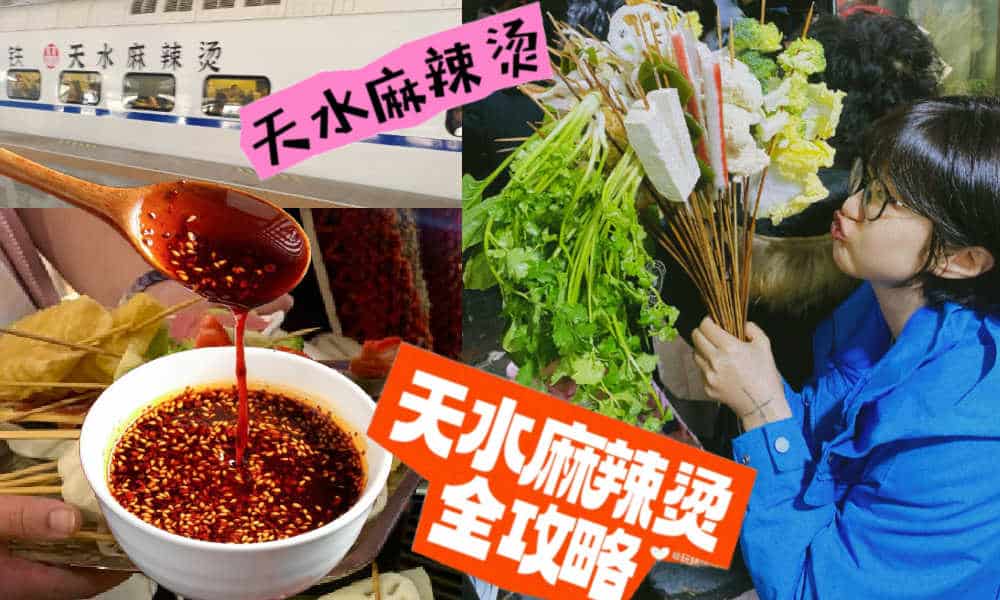
Since the early post-pandemic days, Chinese cities have stepped up their game to attract more tourists. The dynamics of Chinese social media make it possible for smaller, lesser-known destinations to gain overnight fame as a ‘celebrity city.’ Now, it’s Tianshui’s turn to shine.
During this Qingming Festival holiday, there is one Chinese city that will definitely welcome more visitors than usual. Tianshui, the second largest city in Gansu Province, has emerged as the latest travel hotspot among domestic tourists following its recent surge in popularity online.
Situated approximately halfway along the Lanzhou-Xi’an rail line, this ancient city wasn’t previously a top destination for tourists. Most travelers would typically pass through the industrial city to see the Maiji Shan Grottoes, the fourth largest Buddhist cave complex in China, renowned for its famous rock carvings along the Silk Road.
But now, there is another reason to visit Tianshui: malatang.
Gansu-Style Malatang
Málàtàng (麻辣烫), which literally means ‘numb spicy hot,’ is a popular Chinese street food dish featuring a diverse array of ingredients cooked in a soup base infused with Sichuan pepper and dried chili pepper. There are multiple ways to enjoy malatang.
When dining at smaller street stalls, it’s common to find a selection of skewered foods—ranging from meats to quail eggs and vegetables—simmering in a large vat of flavorful spicy broth. This communal dining experience is affordable and convenient for solo diners or smaller groups seeking a hotpot-style meal.
In malatang restaurants, patrons can usually choose from a selection of self-serve skewered ingredients. You have them weighed, pay, and then have it prepared and served in a bowl with a preferred soup base, often with the option to choose the level of spiciness, from super hot to mild.
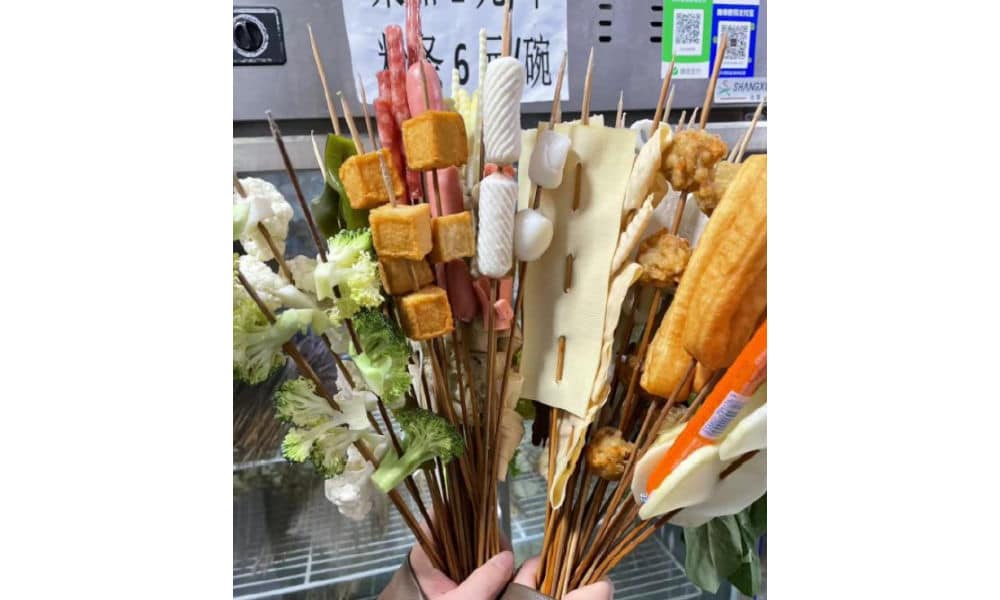
Although malatang originated in Sichuan, it is now common all over China. What makes Tianshui malatang stand out is its “Gansu-style” take, with a special focus on hand-pulled noodles, potato, and spicy oil.
An important ingredient for the soup base is the somewhat sweet and fragrant Gangu chili, produced in Tianshui’s Gangu County, known as “the hometown of peppers.”
Another ingredient is Maiji peppercorns (used in the sauce), and there are more locally produced ingredients, such as the black fungi from Qingshui County.
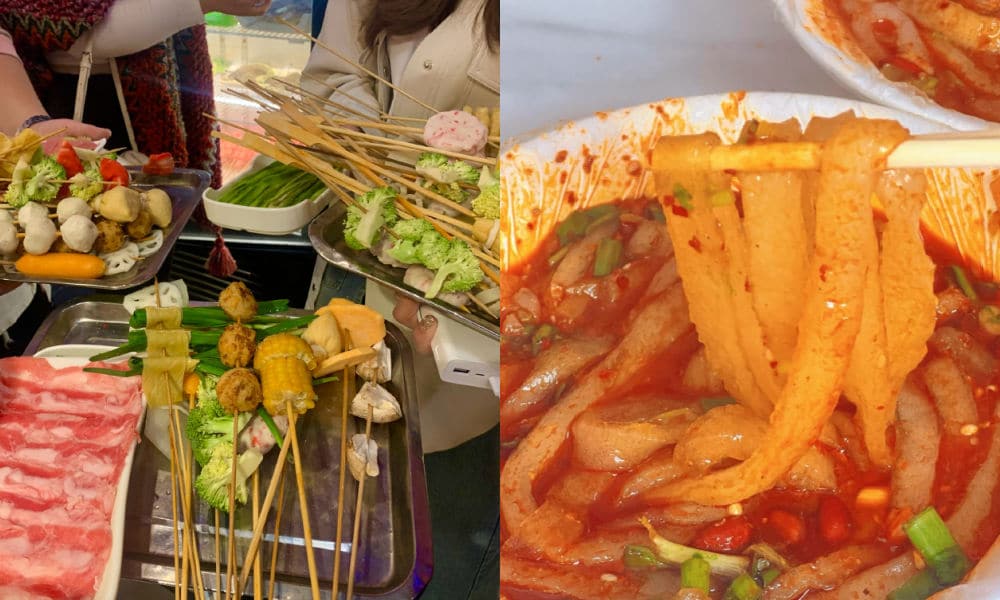
One restaurant that made Tianshui’s malatang particularly famous is Haiying Malatang (海英麻辣烫) in the city’s Qinzhou District. On February 13, the tiny restaurant, which has been around for three decades, welcomed an online influencer (@一杯梁白开) who posted about her visit.
The vlogger was so enthusiastic about her taste of “Gansu-style malatang,” that she urged her followers to try it out. It was the start of something much bigger than she could have imagined.
Replicating Zibo
Tianshui isn’t the first city to capture the spotlight on Chinese social media. Cities such as Zibo and Harbin have previously surged in popularity, becoming overnight sensations on platforms like Weibo, Xiaohongshu, and Douyin.
This phenomenon of Chinese cities transforming into hot travel destinations due to social media frenzy became particularly noteworthy in early 2023.
During the Covid years, various factors sparked a friendly competition among Chinese cities, each competing to attract the most visitors and to promote their city in the best way possible.
The Covid pandemic had diverse impacts on the Chinese domestic tourism industry. On one hand, domestic tourism flourished due to the pandemic, as Chinese travelers opted for destinations closer to home amid travel restrictions. On the other hand, the zero-Covid policy, with its lockdowns and the absence of foreign visitors, posed significant challenges to the tourism sector.
Following the abolition of the zero-Covid policy, tourism and marketing departments across China swung into action to revitalize their local economy. China’s social media platforms became battlegrounds to capture the attention of Chinese netizens. Local government officials dressed up in traditional outfits and created original videos to convince tourists to visit their hometowns.
Zibo was the first city to become an absolute social media sensation in the post-Covid era. The old industrial and mining city was not exactly known as a trendy tourist destination, but saw its hotel bookings going up 800% in 2023 compared to pre-Covid year 2019. Among others factors contributing to its success, the city’s online marketing campaign and how it turned its local BBQ culture into a unique selling point were both critical.

Zibo crowds, image via 163.com.
Since 2023, multiple cities have tried to replicate the success of Zibo. Although not all have achieved similar results, Harbin has done very well by becoming a meme-worthy tourist attraction earlier in 2024, emphasizing its snow spectacle and friendly local culture.
By promoting its distinctive take on malatang, Tianshui has emerged as the next city to captivate online audiences, leading to a surge in visitor numbers.
Like with Zibo and Harbin, one particular important strategy used by these tourist offices is to swiftly respond to content created by travel bloggers or food vloggers about their cities, boosting the online attention and immediately seizing the opportunity to turn online success into offline visits.
A Timeline
What does it take to become a Chinese ‘celebrity city’? Since late February and early March of this year, various Douyin accounts started posting about Tianshui and its malatang.
They initially were the main reason driving tourists to the city to try out malatang, but they were not the only reason – city marketing and state media coverage also played a role in how the success of Tianshui played out.
Here’s a timeline of how its (online) frenzy unfolded:
- July 25, 2023: First video on Douyin about Tianshui’s malatang, after which 45 more videos by various accounts followed in the following six months.
- Feb 5, 2024: Douyin account ‘Chuanshuo Zhong de Bozi’ (传说中的波仔) posts a video about malatang streetfood in Gansu
- Feb 13, 2024: Douyin account ‘Yibei Liangbaikai’ (一杯梁白开) posts a video suggesting the “nationwide popularization of Gansu-style malatang.” This video is an important breakthrough moment in the success of Tianshui as a malatang city.
- Feb – March ~, 2024: The Tianshui Culture & Tourism Bureau is visiting sites, conducting research, and organizing meetings with different departments to establish the “Tianshui city + malatang” brand (文旅+天水麻辣烫”品牌) as the city’s new “business card.”
- March 11, 2024: Tianshui city launches a dedicated ‘spicy and hot’ bus line to cater to visitors who want to quickly reach the city’s renowned malatang spots.
- March 13-14, 2024: China’s Baidu search engine witnesses exponential growth in online searches for Tianshui malatang.
- March 14-15, 2024: The boss of Tianshui’s popular Haiying restaurant goes viral after videos show him overwhelmed and worried he can’t keep up. His facial expression becomes a meme, with netizens dubbing it the “can’t keep up-expression” (“烫不完表情”).
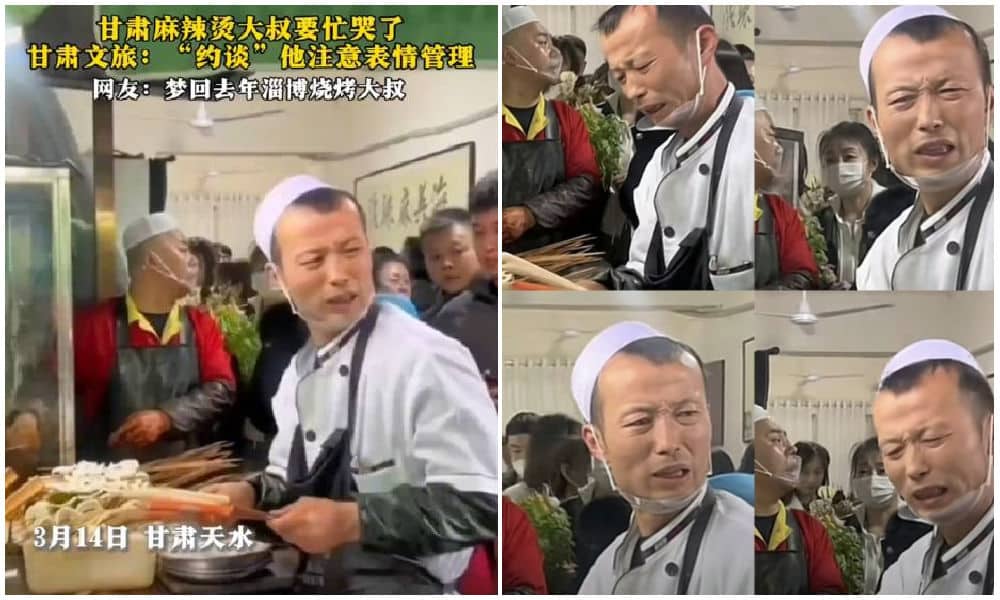
The worried and stressed expression of this malatang diner boss went viral overnight.
- March 17, 2024: Chinese media report about free ‘Tianshui malatang’ wifi being offered to visitors as a special service while they’re standing in line at malatang restaurants.
- March 18, 2024: Tianshui opens its first ‘Malatang Street’ where about 40 stalls sell malatang.
- March 18, 2024: Chinese local media report that one Tianshui hair salon (Tony) has changed its shop into a malatang shop overnight, showing just how big the hype has become.
- March 21, 2024: A dedicated ‘Tianshui malatang’ train started riding from Lanzhou West Station to Tianshui (#天水麻辣烫专列开行#).
- March 21, 2024: Chinese actor Jia Nailiang (贾乃亮) makes a video about having Tianshui malatang, further adding to its online success.
- March 30, 2024: A rare occurrence: as the main attraction near Tianshui, the Maiji Mountain Scenic Area announces that they’ve reached the maximum number of visitors and don’t have the capacity to welcome any more visitors, suspending all ticket sales for the day.
- April 1, 2024: Chinese presenter Zhang Dada was spotted making malatang in a local Tianshui restaurant, drawing in even more crowds.
A New Moment to Shine
Fame attracts criticism, and that also holds true for China’s ‘celebrity cities.’
Some argue that Tianshui’s malatang is overrated, considering the richness of Gansu cuisine, which offers much more than just malatang alone.
When Zibo reached hype status, it also faced scrutiny, with some commenters suggesting that the popularity of Zibo BBQ was a symptom of a society that’s all about consumerism and “empty social spectacle.”
There is a lot to say about the downsides of suddenly becoming a ‘celebrity city’ and the superficiality and fleetingness that comes with these kinds of trends. But for many locals, it is seen as an important moment as they see their businesses and cities thrive.
Even after the hype fades, local businesses can maintain their success by branding themselves as previously viral restaurants. When I visited Zibo a few months after its initial buzz, many once-popular spots marketed themselves as ‘wanghong’ (网红) or viral celebrity restaurants.
For the city itself, being in the spotlight holds its own value in the long run. Even after the hype has peaked and subsided, the gained national recognition ensures that these “trendy” places will continue to attract visitors in the future.
According to data from Ctrip, Tianshui experienced a 40% increase in tourism spending since March (specifically from March 1st to March 16th). State media reports claim that the city saw 2.3 million visitors in the first three weeks of March, with total tourism revenue reaching nearly 1.4 billion yuan ($193.7 million).
There are more ripple effects of Tianshui’s success: Maiji Shan Grottoes are witnessing a surge in visitors, and local e-commerce companies are experiencing a spike in orders from outside the city. Even when they’re not in Tianshui, people still want a piece of Tianshui.
By now, it’s clear that tourism marketing in China will never be the same again. Zibo, Harbin, and Tianshui exemplify a new era of destination hype, requiring a unique selling point, social media success, strong city marketing, and a friendly and fair business culture at the grassroots level.
While Zibo’s success was largely organic, Harbin’s was more orchestrated, and Tianshui learned from both. Now, other potential ‘celebrity’ cities are preparing to go viral, learning from the successes and failures of their predecessors to shine when their time comes.
By Manya Koetse
Independently reporting China trends for over a decade. Like what we do? Support us and get the story behind the hashtag by subscribing:
Spotted a mistake or want to add something? Please let us know in comments below or email us. First-time commenters, please be patient – we will have to manually approve your comment before it appears.
©2024 Whatsonweibo. All rights reserved. Do not reproduce our content without permission – you can contact us at info@whatsonweibo.com.
Subscribe

A Brew of Controversy: Lu Xun and LELECHA’s ‘Smoky’ Oolong Tea

Weibo Watch: The Battle for the Bottom Bed

Zara Dress Goes Viral in China for Resemblance to Haidilao Apron

“Old Bull Eating Young Grass”: 86-Year-Old Chinese Painter Fan Zeng Marries 36-Year-Old Xu Meng

Chengdu Disney: The Quirkiest Hotspot in China

The ‘Two Sessions’ Suggestions: Six Proposals Raising Online Discussions

Top 9 Chinese Movies to Watch This Spring Festival Holiday

“Old Bull Eating Young Grass”: 86-Year-Old Chinese Painter Fan Zeng Marries 36-Year-Old Xu Meng

Party Slogan, Weibo Hashtag: “The Next China Will Still Be China”

From Pitch to Politics: About the Messy Messi Affair in Hong Kong (Updated)

Chengdu Disney: The Quirkiest Hotspot in China

Looking Back on the 2024 CMG Spring Festival Gala: Highs, Lows, and Noteworthy Moments

More than Malatang: Tianshui’s Recipe for Success

Two Years After MU5735 Crash: New Report Finds “Nothing Abnormal” Surrounding Deadly Nose Dive

The Chinese Viral TikTok Song Explained (No, It’s Not About Samsung)
Get in touch
Would you like to become a contributor, or do you have any tips or suggestions? Get in touch here!
Popular Reads
-

 China Insight2 months ago
China Insight2 months agoThe ‘Two Sessions’ Suggestions: Six Proposals Raising Online Discussions
-

 China Arts & Entertainment3 months ago
China Arts & Entertainment3 months agoTop 9 Chinese Movies to Watch This Spring Festival Holiday
-

 China Arts & Entertainment3 weeks ago
China Arts & Entertainment3 weeks ago“Old Bull Eating Young Grass”: 86-Year-Old Chinese Painter Fan Zeng Marries 36-Year-Old Xu Meng
-

 China Media2 months ago
China Media2 months agoParty Slogan, Weibo Hashtag: “The Next China Will Still Be China”


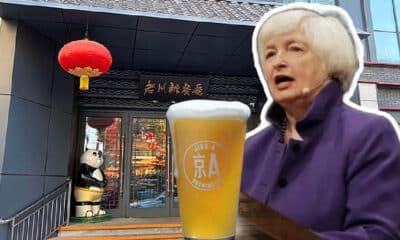



John Rain
September 30, 2016 at 2:31 am
I don’t know whether Chinese people’s thin skinned nationalism is more funny or pathetic. China, as a nation, is a sulky 2-year old.
Wang Wei Guo
October 1, 2016 at 9:38 am
When foreign barbarians and raiders burn down your national monuments, rape your children, loot your history and tarnish your culture you can complain about our “thin skinned nationalism”, until then know that we forget not and we forgive never. 勿忘國耻, 以身报国
John Rain
October 2, 2016 at 8:43 am
“burn down your national monuments, rape your children, loot your history and tarnish your culture” This also describes the Communist Party under Mao, yet both the party and Mao are held in very high regard today, how is this possible if you “forget not and […] forgive never”?
Silver Sterling
October 1, 2016 at 6:17 pm
John Rain,
And it concerns aWestern degenerate accursed breed like you ……because?
Oh yeah, I know, as a an accursed bloodthirsty breed you guys are ALWAYS looking for trouble stirring up shit when it does not concern you. Westerners , as a breed, are inflammatory, savages always looking to start shit from physically bombing and hijacking other countries to playing the Big Brother – always have a need to dissed others PROACTIVELY.
John Rain
October 2, 2016 at 8:47 am
It concerns me because the Chinese government used “hurt feelings” to censor things they don’t like outside China’s borders. I don’t know about you, but I’m a fan of free speech and free media. I hope alluding to the fact that China has neither won’t hurt your feelings even more?
John Rain
October 2, 2016 at 8:39 am
Thanks to both Wang Wei Guo and Silver Sterling for proving my point better than I could ever hope to. Thank you, both of you!
Silver Sterling
October 1, 2016 at 6:24 pm
Btw, the Taiwanese “model” look like those plastic surgery whore-wannabe-model. In HK this type of “leng-mo” is a source of joke and ridicule. Basically slut -like clowns.
Dress and act like a slut with those fake ass ,pouty 3 year old demeanor, then crap about lusty hounds wanting to approach her? Anyone wanna wager her breast is implants and those features are cosmetic surgery?
Erisadesu
December 7, 2016 at 7:15 pm
oh well.. it seems that everyone in this world is more sensitive, you can’t make sarcasm or ironic remarks or tell a joke because you don’t know who you will offend any more…but all those people who want to use china for making money should be more carefull on what they are saying….